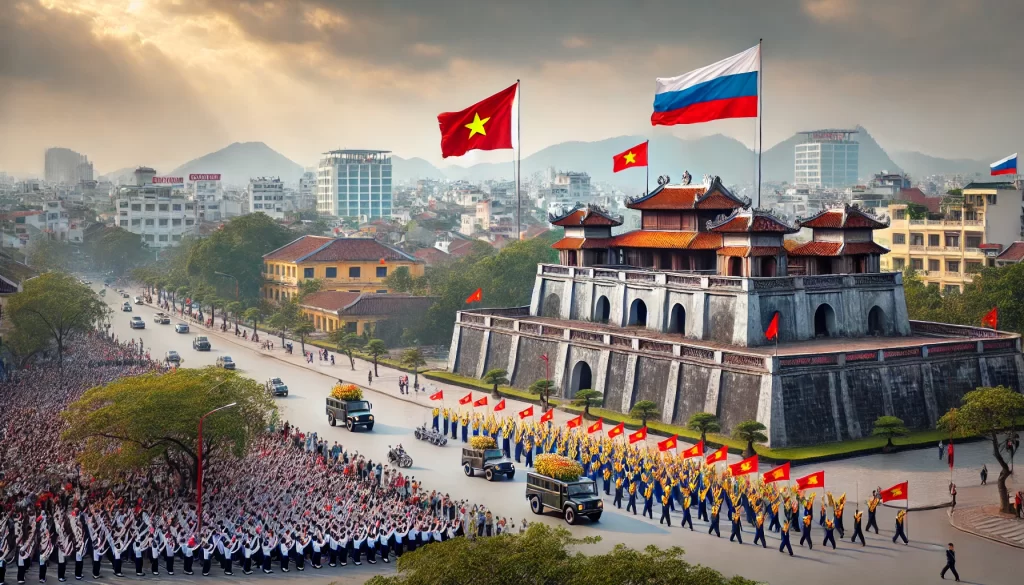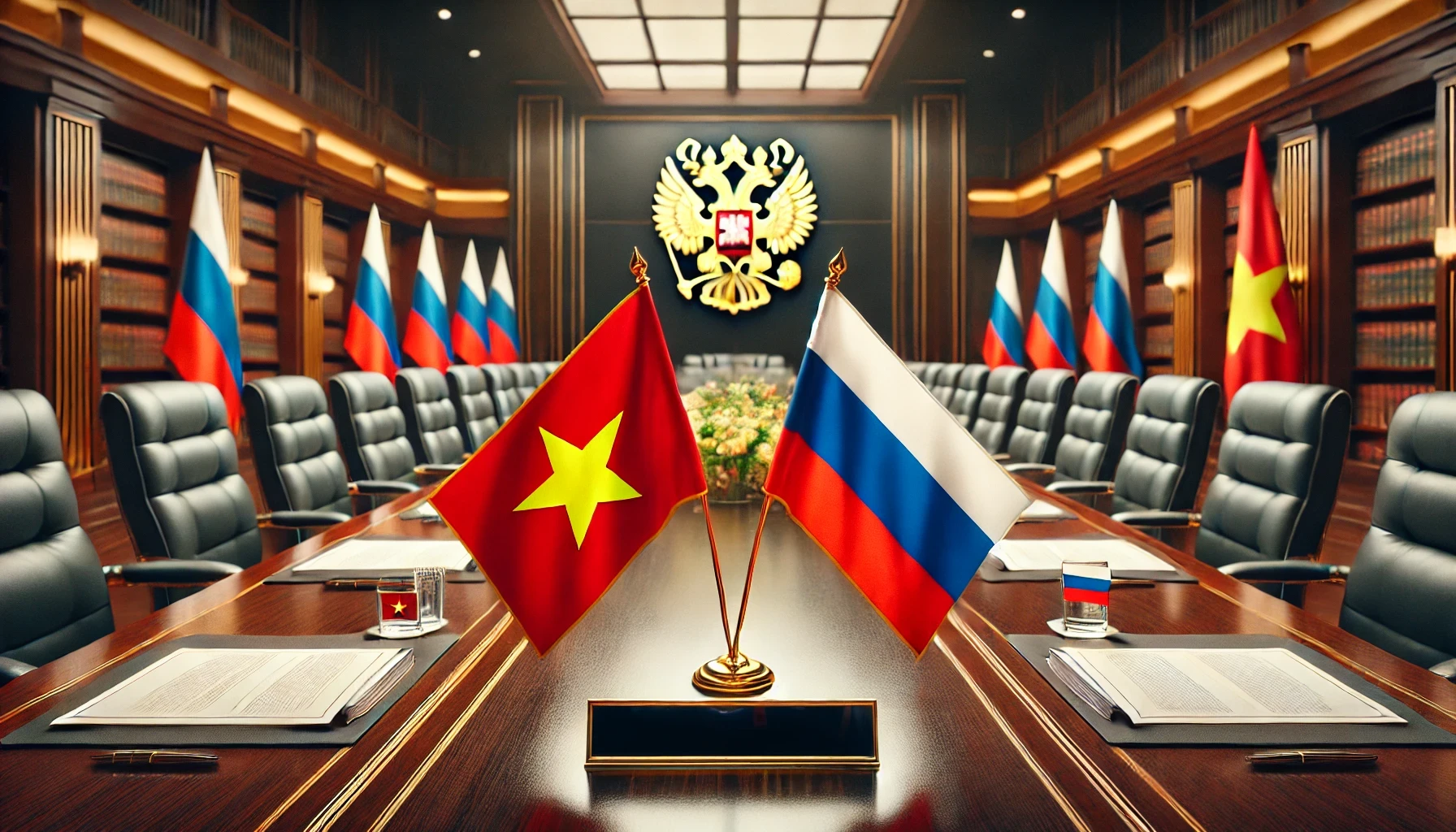On Thursday, President Vladimir Putin of Russia made a significant visit to Vietnam following his trip to North Korea, highlighting the complex dynamics between Russia, Vietnam, and the broader geopolitical landscape.
Background and Purpose
Putin’s visit to Vietnam came shortly after his meeting with North Korean leader Kim Jong Un, where the focus was on military cooperation, including reviving a Cold War-era mutual defense agreement. In contrast, his visit to Vietnam was less provocative. Vietnam values its relationship with the United States, which could be jeopardized if Putin made fiery statements about Washington while in Hanoi. Instead, discussions centered on boosting ties in trade, education, energy, and technology.
Vietnam’s Strategic Position
Vietnam has emerged as a key player in Southeast Asia, balancing relationships with major powers such as the United States, China, and Russia. This approach, often referred to as “bamboo diplomacy,” allows Vietnam to maintain flexibility and avoid alienating any major power. During Putin’s visit, both sides emphasized their historical ties and discussed enhancing their strategic partnership. In 2001, Russia was the first country to sign a strategic partnership agreement with Vietnam.
Geopolitical Implications
The visit underscored Russia’s attempt to showcase that it remains a significant global player despite Western sanctions and isolation over the Ukraine conflict. By engaging with Vietnam, Russia aimed to demonstrate that it still has influential allies in Asia. This was part of a broader effort by Putin to project international legitimacy and counter Western attempts to isolate Russia.
Mutual Interests and Concerns
Russia and Vietnam have a long history of military and economic cooperation dating back to the Soviet era. Today, Russia remains Vietnam’s largest arms supplier. However, the current discussions avoided public mention of new arms deals, focusing instead on other areas of cooperation such as trade and energy. Putin pledged to supply oil and gas products to Vietnam for the long term. Vietnam’s leaders, while welcoming Putin, remained cautious about not appearing aligned with Russia’s stance on Ukraine, reflecting their nuanced foreign policy.

Vietnam’s Stance on Ukraine
Since the start of the war in Ukraine, Vietnam has officially taken a neutral stance. It has abstained on United Nations resolutions condemning Russia’s invasion and voted against removing Russia from the U.N. Human Rights Council. Vietnam has also provided humanitarian aid to Ukraine through international organizations but skipped the Ukraine peace summit in Switzerland. This balancing act reflects Vietnam’s historical experiences and its principle of maintaining territorial integrity and sovereignty.
Diplomatic Show and Domestic Reception
Putin’s visit was marked by a 21-gun salute at the Imperial Citadel of Thang Long and a ceremonial welcome with Vietnamese schoolchildren waving Russian and Vietnamese flags. This was Putin’s fifth visit to Vietnam since 2001 but his first since the full-scale invasion of Ukraine. The visit was carefully managed to avoid any actions that might suggest Vietnam was aligning itself with Russia against the West.
Conclusion
Putin’s visit to Vietnam highlighted the intricate balancing act Hanoi performs in its foreign relations. While reinforcing ties with Russia, Vietnam continues to engage with other major powers, maintaining a delicate equilibrium that serves its national interests and regional stability.
The visit underscored the enduring historical ties between Russia and Vietnam while also reflecting the current geopolitical realities. Vietnam’s ability to maintain a balanced foreign policy, engaging with multiple major powers without alienating any, is a testament to its diplomatic skill and strategic importance in the region.
This article is based on the following articles:
https://www.aljazeera.com/news/2024/6/19/why-is-russias-putin-visiting-vietnam-after-north-korea

Background Information
1. Russia-Vietnam Relations
Historical Ties:
- Soviet Union Support: The relationship between Russia and Vietnam dates back to the Cold War era. The Soviet Union was among the first countries to recognize the Democratic Republic of Vietnam (North Vietnam) in 1950. During the Vietnam War, the Soviet Union provided significant military and economic support to North Vietnam, helping it fight against the United States and its allies.
- Post-War Cooperation: After the Vietnam War, the Soviet Union continued to support Vietnam through economic aid, educational exchange programs, and military assistance. This support laid the foundation for the strong ties that exist between Russia and Vietnam today.
Current Relations:
- Strategic Partnership: In 2001, Russia became the first country to sign a strategic partnership agreement with Vietnam, emphasizing cooperation in various fields such as trade, defense, energy, and education.
- Economic Cooperation: Russia and Vietnam collaborate on numerous economic projects, particularly in the energy sector. Russian companies are involved in oil and gas exploration and production in Vietnam, which is crucial for Vietnam’s energy security.
2. Vietnam’s Geopolitical Position
Balancing Major Powers:
- “Bamboo Diplomacy”: Vietnam’s foreign policy is often described as “bamboo diplomacy,” reflecting its ability to bend and adapt to changing geopolitical circumstances without breaking. This means maintaining good relations with major powers like the United States, China, and Russia while protecting its own national interests.
- Relations with the United States: Vietnam has significantly improved its relations with the United States over the past few decades. This includes cooperation in areas such as trade, security, and education. The two countries have shared interests in maintaining regional stability and countering China’s influence in the South China Sea.
Strategic Importance:
- Southeast Asia: Vietnam is a key player in Southeast Asia, a region of strategic importance due to its location and economic potential. The country is a member of the Association of Southeast Asian Nations (ASEAN), which promotes regional cooperation and economic integration.
- South China Sea Dispute: Vietnam is one of several countries involved in territorial disputes with China over islands and maritime rights in the South China Sea. This has led Vietnam to seek stronger ties with other major powers to counterbalance China’s influence.
3. Russia’s Global Position and Ukraine Conflict
Isolation by the West:
- Sanctions and Diplomacy: Following Russia’s annexation of Crimea in 2014 and its full-scale invasion of Ukraine in 2022, Western countries have imposed extensive economic sanctions on Russia. These sanctions target key sectors such as finance, energy, and defense, aiming to pressure Russia to withdraw from Ukraine.
- International Isolation: The West has also sought to diplomatically isolate Russia, reducing its influence in international organizations and forums. However, Russia has continued to cultivate relationships with non-Western countries to counterbalance this isolation.
Ukraine Conflict:
- Background: The conflict in Ukraine began in 2014 when Russia annexed Crimea, leading to a war between Ukrainian forces and Russian-backed separatists in Eastern Ukraine. In 2022, Russia launched a full-scale invasion of Ukraine, resulting in significant casualties and displacement of civilians.
- Global Response: The international community, particularly Western nations, has condemned Russia’s actions and provided military and humanitarian aid to Ukraine. Several United Nations resolutions have been passed condemning the invasion, though some countries, like Vietnam, have abstained from voting to maintain a neutral stance.
4. Vietnam’s Neutral Stance on Ukraine
Balancing Act:
- Neutrality: Since the start of the Ukraine conflict, Vietnam has maintained a neutral stance. This is in line with its policy of not taking sides in major international conflicts to preserve its own national interests and diplomatic relationships.
- Humanitarian Aid: Despite its neutral stance, Vietnam has provided humanitarian aid to Ukraine through international organizations, reflecting its commitment to humanitarian principles.
Historical Context:
- Legacy of Conflict: Vietnam’s history of being invaded and occupied by foreign powers (France, Japan, the United States, and China) has shaped its strong emphasis on sovereignty and territorial integrity. This principle influences its cautious approach to international conflicts, including the Ukraine war.
5. Diplomatic Visits and Symbolism
Significance of State Visits:
- Symbolic Gestures: Diplomatic visits, such as Putin’s trip to Vietnam, often involve symbolic gestures like military salutes, flag-waving schoolchildren, and visits to historical sites. These gestures serve to reinforce the historical and cultural ties between countries.
- Public Statements: During such visits, leaders typically make public statements that emphasize shared values and goals. These statements are carefully crafted to avoid offending any major power and to highlight the positive aspects of the bilateral relationship.
Impact on International Relations:
- Strengthening Ties: These visits help to strengthen bilateral relations by providing opportunities for leaders to discuss and negotiate agreements on various issues, from economic cooperation to defense partnerships.
Projecting Influence: For countries like Russia, state visits to influential countries like Vietnam help to project an image of continued global influence and counter attempts at diplomatic isolation.

Debate/Essay Questions
- Is Vietnam’s “bamboo diplomacy” an effective strategy for maintaining national security and economic growth in a complex international landscape?
Please subscribe to Insight Fortnight, our biweekly newsletter!
